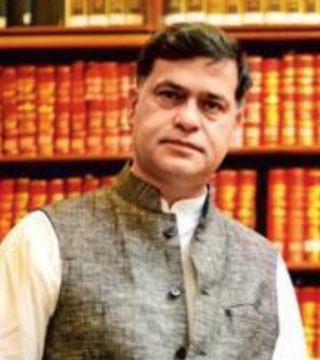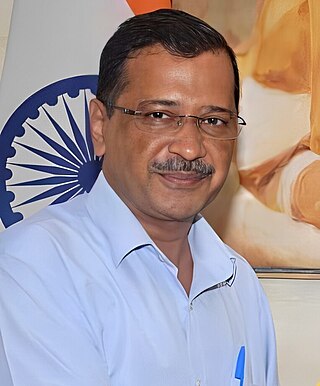
The Central Bureau of Investigation (CBI) is the domestic crime investigating agency of India. It operates under the jurisdiction of the Ministry of Personnel, Public Grievances and Pensions. Originally set up to investigate bribery and governmental corruption, in 1965 it received expanded jurisdiction to investigate breaches of central laws enforceable by the Government of India, multi-state organised crime, multi-agency or international cases. CBI is exempted from the provisions of the Right to Information Act. CBI is India's officially designated single point of contact to act as the liaison with Interpol. The CBI headquarter is located in CGO Complex, near Jawaharlal Nehru Stadium in New Delhi.

The Bofors scandal was a major weapons-contract political scandal that occurred between India and Sweden during the 1980s and 1990s, initiated by Indian National Congress politicians and implicating the Indian prime minister, Rajiv Gandhi, and several other members of the Indian and Swedish governments. These politicians were accused of receiving kickbacks from Bofors AB, an arms manufacturer principally financed by the Wallenberg family's Skandinaviska Enskilda Banken, for winning a bid to supply to India the company's 155 mm field howitzer – the sale of 410 field howitzers, and a supply contract for almost twice that amount, totalling a US$1.4 billion deal. It was the biggest arms deal ever in Sweden, and money marked for development projects was diverted to secure this contract at any cost. The investigations revealed flouting of rules and bypassing of institutions.
The Hawala scandal, also called the Jain Diaries case or the hawala scam, was an Indian political and financial scandal involving payments allegedly sent by politicians through four hawala brokers, namely the Jain brothers. It was a US$18 million bribery scandal that implicated some of the country's leading politicians.

Prashant Bhushan is an Indian author and a public interest lawyer in the Supreme Court of India. He was a member of the faction of the India Against Corruption (IAC) movement known as Team Anna which supported Anna Hazare's campaign for the implementation of the Jan Lokpal Bill. After a split in IAC, he helped Team Anna form the Aam Aadmi Party. In 2015, he made several allegations against the party's leadership, its functioning and its deviation from the core ideology, values and commitments. He is one of the founders of Swaraj Abhiyan and Sambhaavnaa, an Institute of Public Policy and Politics.

Vinod Rai is a former IAS officer who served as the 11th Comptroller and Auditor General of India. He assumed office on 7 January 2008 till 22 May 2013. He is the current chairman of UN Panel of External Auditors and Honorary Advisor to the Indian Railways and a member of the Railway Kaya Kalp Council.

Gopal Subramanium is an Indian lawyer, international arbitrator, academic and Senior Advocate who practices primarily in the Supreme Court of India and the Delhi High Court. He served as the Solicitor General of India 2009–2011 and Additional Solicitor General of India 2005–2009. He served as Chairman of the Bar Council of India 2010–2011.
The 2G spectrum case was a political controversy in which politicians and private officials of the United Progressive Alliance (UPA) coalition government India were allegedly involved in selling or allotting 122 2G spectrum licenses on conditions that provided an advantage to specific telecom operators. A. Raja, then Telecom Minister, was accused of selling 2G spectrum licenses at a very low cost which resulted in the loss of ₹1,760 billion in government revenue. Raja was also accused of not following rules and regulations as well as not recognizing any advice from the Ministries of Finance and Law and Justice of India while allotting 2G spectrum licenses to telecom operators. Series of allegations were made on allotting 2G spectrum licenses including allegations from Central Bureau of Investigation after investigating the case alleging Raja for intentionally advancing the cut-off date to favour some specific firms, which were allegedly ineligible for applying for telecom licenses, in return for bribes.

Sanjay Chandra is the former Managing Director of Unitech Ltd, India's second-largest real estate investment company. Sanjay Chandra and Ajay Chandra had undergone two and a half years of incarceration in the case, having a maximum punishment of 7 years. After 7 years of punishment, he was given bail in a Unitech money laundering case. He is also on the board of Unitech Wireless.
In India, a binding decision of the Supreme Court/High Court can be reviewed in review petition. The parties aggrieved on any order of the Supreme Court on any apparent error can file a review petition. Taking into consideration the principle of stare decisis, courts generally do not unsettle a decision, without a strong case. This provision regarding review is an exception to the legal principle of stare decisis.
Arjan Kumar Sikri is an eminent jurist and a former judge of the Supreme Court of India. He was sworn in as a Supreme Court judge on 12 April 2013. Earlier, he had served as the chief justice of the Punjab and Haryana High Court. He retired as senior most puisne judge of Supreme Court of India on 6 March 2019.

Sidharth Luthra is a senior advocate at the Supreme Court of India. In July 2012, Sidharth Luthra was appointed as the Additional Solicitor General of India at the Supreme Court and represented the union and various state governments in matters relating to fundamental rights, electoral reforms, criminal law and policy issues. He resigned from this position in May 2014. He is the son of K.K. Luthra who was also a senior advocate and brother of senior advocate Geeta Luthra.
Sanjiv Chaturvedi is an Indian Forest Service (IFoS) officer posted as Chief Conservator of Forest (Research) at Haldwani in the Nainital district of Uttarakhand. Chaturvedi was a Chief Vigilance Officer (CVO) at AIIMS, New Delhi from 2012 to 2014, and served in the government of Haryana from 2005 to 2012.
Aman Lekhi is a senior advocate of the Supreme Court of India and is the former Additional Solicitor General of India in the Apex Court. He is named in the list of Top 100 Legal Luminaries of India by LexisNexis in May 2016.
Sadhana Sanjay Jadhav is a former judge of the Bombay High Court, in Maharashtra, India. Jadhav has been the judge in a number of notable cases concerning criminal offences, including the death of Sheena Bora, the Adarsh Housing Society scam, the trial of Bollywood actor Sanjay Dutt in relation to the 1993 Bombay bombings, the case concerning the suicide of medical resident Payal Tadvi, and the case concerning the murder of writer Govind Pansare. Jadhav is also responsible for several legally significant interpretations of criminal law and procedure, concerning the right to appeal, and regarding penalties under the Scheduled Caste and Scheduled Tribe Act 1989.

Rebecca Mammen John is a Senior Advocate at the Supreme Court of India, and works primarily in the field of criminal defence. She has represented parties in several widely reported cases, including the families of victims of the 1987 Hashimpura massacre, Indian stockbroker Harshad Mehta, and the accused in the Aarushi murder case. She has also been appointed as a Special Public Prosecutor on occasion by the High Court of Delhi, and frequently comments in leading newspapers and the media on issues of criminal justice reform in India.
Veena Birbal is a former judge of the Delhi High Court in India, and the former president of the Delhi State Consumer Disputes Redressal Commission. She has adjudicated in a number of significant Indian cases concerning criminal offences and corruption, including the Scorpene deal scam, the 2G spectrum case, the Nitish Katara murder case, and the Uphaar Cinema Fire litigation.
Amarendra Sharan (1949–2019) was Additional Solicitor General of India from 2004 to 2009 and a designated senior attorney at the Indian Supreme Court. He appeared in a number of prominent cases including coal allocation and 2G scam cases on behalf of CBI, the Priyadarshi Mattoo case, and the re-investigation of Mahatma Gandhi's murder.

Sanjay R Hegde is a senior advocate at the Supreme Court of India. He is a leading voice for civil rights He was one of the two amicus curiae appointed by the Supreme Court of India to assist the court in the 2012 Delhi gang rape and murder. He was appointed as an interlocutor by the Supreme Court of India to talk to the protestors at Shaheen Bagh protest.
Gopal Sankaranarayanan is an Indian lawyer practicing at the Supreme Court of India. He was designated as a senior advocate by the Supreme Court of India in March 2019. He is known for his specialization in Constitutional law. He served as the secretary of the Lodha Committee, appointed by the Supreme Court of India in 2015 to bring about reforms in cricket administration in India. He has provided assistance to the Supreme Court as an Amicus curiae in numerous cases. In April 2022, the Supreme Court appointed him as Amicus curiae to assist in the finalization of the Constitution of the All India Football Federation (AIFF).

Arvind Kejriwal, the chief minister of Delhi, India, was arrested on 21 March 2024 around 09:00 pm IST after not responding to nine summons from the Enforcement Directorate (ED) in connection with the Delhi liquor scam, becoming the first sitting chief minister in Indian history to be arrested. He was given interim bail by the Supreme Court of India from 10 May 2024 to 1 June 2024 to campaign for 2024 Indian general election. Kejriwal surrendered at the Tihar Jail on 2 June 2024 after the expiration of this bail. A Delhi trial court granted bail to Kejriwal on 20 June, which was stayed by the Delhi High Court on 21 June before he could be released. Kejriwal was questioned for three days and arrested on 26 June 2024 by Central Bureau of Investigation (CBI) from Tihar Jail and subsequently was sent to judicial custody till 12 July. The Supreme Court granted interim bail to Kejriwal in money laundering case related to the alleged excise policy scam on 12 July 2024, but he remained in Tihar Jail as he was also arrested by CBI in corruption case related to the alleged liquor policy scam. The Supreme Court granted bail to Kejriwal on 13 September 2024 in the CBI corruption case after serving more than five months in prison.










